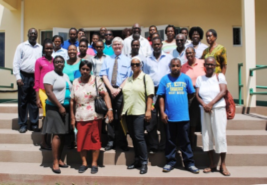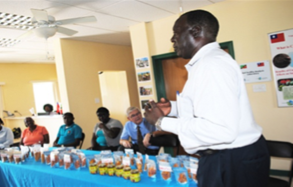October 2015: Mango is one of the most prolific and productive fruits grown in St.
October 2015: Mango is one of the most prolific and productive fruits grown in St. Kitts and Nevis. However, a large amount of this natural resource remains underutilized and goes to waste. A request was submitted by the Minister of Agriculture, the Honourable Eugene Hamilton, to the Inter-American Institute for Cooperation on Agriculture (IICA) to assist in enhancing the profitability of the Mango Industry through greater utilization of value added products. In this regard, a project was developed to assist in improving the incomes of the small scale mango farmers and agro-processors in St. Kitts and Nevis. With IICA’s approval of the project, Dr. Donald Mercer, a professor from Guelph University was contracted to assist with its implementation. This was done by developing capacities and adding value to mango in hygienic conditions that can facilitate access to local and regional markets.

The Project was divided into two phases. Phase I was implemented in October 2015 and involved 4 days of practical and theoretical training in various mango products such as mango powder, mango leather, dried natural mango, mango delight, mango jam and dry candied mango. Some of the topics covered included: the reasons for drying fruits and vegetables; factors influencing quality; blanching of fruits and vegetables; types of dryers; factors influencing drying; mango powder preparation; trail mix product development; and a compendium of mango-base products. A total of 45 persons benefitted from this training and each received a manual on the training.

Phase II of the project is expected to be implemented in early 2016 when training will continue focusing on mango juices. In that Phase, the training will cover topics such as beverage formulation steps and processes; hurdle technology and food additives; beverage cost exercise; chilling and freezing; and Pearson’s Square Calculation.











